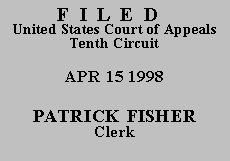

| UNITED STATES OF AMERICA,
v.
KENNETH JORDAN |
No. 97-1329 (D.C. No. 96-CR-498-N) |
Following a guilty plea to charges of armed robbery and use and carrying a firearm in relation to a crime of violence, appellant was sentenced to a term of life under 18 U.S.C. § 3559(c)(1)(A). To arrive at this sentence, the district court applied two prior convictions of armed robbery. Appellant contends the enhancement was improper because the first of those prior offenses was committed more than fifteen years before sentencing in this case.(1) The government correctly points out this makes no difference under the guidelines because appellant had been in custody on that offense within the fifteen-year limitation of U.S.S.G. § 4A1.2(e).
The record indeed shows although appellant was convicted on the first offense on March 9, 1979, he was paroled from that sentence on September 9, 1983. Moreover, having violated that parole and having been reincarcerated, he was paroled again on October 6, 1993. The offense of conviction in this case was committed December 6, 1996, within fifteen years after appellant's 1983 and 1993 release dates. Thus, the initial conviction was appropriately applied by the district court to enhance the present sentence. U.S.S.G. § 4A1.2(e)(1) (enhancement applies when defendant has been "incarcerated during any part of such fifteen-year period."). See United States v. Novey, 922 F.2d 624, 626 (10th Cir. 1991).
Appellant also contends the sentence was a violation of the Eighth Amendment's prohibition of cruel and unusual punishment. The contention is meritless. A sentence within the prescribed statutory limits generally cannot be found to violate the Eighth Amendment. United States v. Youngpeter, 986 F.2d 349 353 (10th Cir. 1993).
The judgment of the district court is AFFIRMED. The motion to withdraw is GRANTED.
ENTERED FOR THE COURT
John C. Porfilio
Circuit Judge
*. This order and judgment is not binding precedent, except under the doctrines of law of the case, res judicata, and collateral estoppel. This court generally disfavors the citation of orders and judgments; nevertheless, an order and judgment may be cited under the terms and conditions of 10th Cir. R. 36.3.
1.Appellant's counsel has filed an Anders brief. Anders v. California, 386 U.S. 738 (1967).